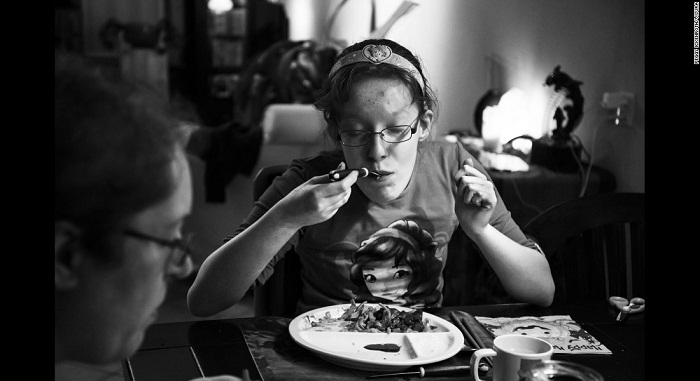Suzanne Heijnen has Prader-Willi syndrome, a genetic condition that is estimated to affect one out of 10,000 to 30,000 people. Peggy Ickenroth met Suzanne a few years ago, when she was 12, and photographed her family over a two-week period, hoping to learn more about the disease and how it affects people.
Prader-Willi symptoms can include low muscle tone, developmental delays and difficulty controlling emotions. Indeed, Suzanne has problems with her spine, tires easily and is prone to furious outbursts over minor slights.
But the most prominent symptom of Prader-Willi is an insatiable appetite, which can lead to dangerous levels of obesity and myriad other health problems. She has been on a limited diet since age 2 and knew there were strict rules about what she could and could not eat.
"When you have an obsession for food and you would like to eat anything, the whole day long, because you never feel sated, it`s really hard," Suzanne`s mother, Gonny Heijnen Corstjens, told Ickenroth. "We`re always aware of the fact that one day she might start to plunder the refrigerator."
Suzanne reveres routine. She feels safe in her home, at school, at judo -- places where she knows exactly how things will unfold. She has the intellectual and emotional development of a 5-year-old, her parents told Ickenroth. They warned that if Suzanne didn`t warm to Ickenroth immediately, she probably never would -- and she certainly wouldn`t allow Ickenroth to photograph her.
But when they met at the family`s home in the Netherlands, "she showed me immediately her room, her favorite toys, her favorite blanket -- like a little girl," Ickenroth said. "She liked to tell about herself."
Suzanne happily allowed Ickenroth to follow her to judo -- an important activity to build her strength and keep her weight under control -- and as she played violin. For years, Suzanne had begged to learn to play, Ickenroth said, and she used a specialized system rather than playing with traditional sheet music.
Suzanne`s parents were devoted to caring for Suzanne and her brother, Thiemo, Ickenroth said. She witnessed warm moments between mother and daughter as they explored their neighborhood on a specialized bike, or as Suzanne`s mother helped her in the shower. The family often went to concerts and plays together, although going out in public always felt risky, especially as Suzanne continued to grow.
Out of nowhere, Suzanne would sometimes scream or sob, reacting to a conversation from days earlier or noticing that an object was moved from its usual place. If she were a toddler, nobody would be surprised, her mother lamented to the photographer. But Suzanne`s physical differences are subtle. To many people, she looked like any other teen.
Ickenroth said she wasn`t sure at first whether to photograph Suzanne in color or black and white. It didn`t take long to decide.
"For her things are black or white," Ickenroth said. "I felt like the light was the right thing to do."
In Ickenroth`s favorite image, Suzanne stares at herself in the mirror as her mother brushes her hair. Her glasses are off and there`s a streak of light in her face. Just a frame later, the child was back -- the crooked smiles, playful eyes, the tiaras, braids and glitter. But in that instant of calm, Ickenroth thought she saw another side to Suzanne.
"It`s one of the few moments that I felt like I really saw a 12-year-old there," Ickenroth said. "She seemed like a fierce woman."
Suzanne`s parents told Ickenroth that they don`t know what Suzanne`s future will hold. She`s 14 now, and they expect her health problems will grow worse as she gets older. They don`t know how she will develop, emotionally or intellectually, or where she`ll live out her life.
"We just want to cherish this time we have with Suzanne," Ickenroth recalls them saying, "without thinking too much about the future."
More about:
















































